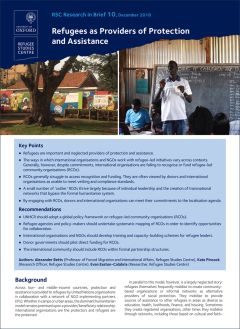Research in Brief: Refugees as Providers of Protection and Assistance
Alexander Betts, Kate Pincock and Evan Easton-Calabria

Across low- and middle-income countries, protection and assistance is provided to refugees by United Nations organisations in collaboration with a network of NGO implementing partners (IPs). Whether in camps or urban areas, the dominant humanitarian model remains premised upon a provider/beneficiary relationship: international organisations are the protectors and refugees are the protected. In parallel to this model, however, is a largely neglected story: refugees themselves frequently mobilise to create community-based organisations or informal networks as alternative providers of social protection. They mobilise to provide sources of assistance to other refugees in areas as diverse as education, health, livelihoods, finance, and housing. Sometimes they create registered organisations, other times they mobilise through networks. They usually do so despite a lack of access to external funding or recognition. Sometimes, these informal sources of social protection may even be regarded by refugee recipients as more important than formal sources of assistance. Using a mixed methods approach based on ethnographic research and survey methods, we have examined four contrasting cases of refugee-led social protection in Kenya (Nairobi and Kakuma) and Uganda (Kampala and Nakivale). In our research, we explore what constrains and enables affected communities to be active providers of social protection. In this brief, we outline some of our findings and their implications for policy and practice. [PDF file 2.9MB]
Type
Research in Brief
Publisher
Refugee Studies Centre
Publication Date
12/12/2018
Volume
RSC Research in Brief 10
Total pages
6